The Political Economy Research Institute at MTSU recently hosted a presentation with author and Wall Street Journal columnist Jason Riley on his new biography on economist Thomas Sowell.
The lecture, “Maverick: A Biography of Thomas Sowell,” was hosted by the PERI in celebration of Black History Month at MTSU on Feb. 17.
Riley opened his discussion on how Sowell, considered one of the finest minds in social theory in the last half-century, is largely unknown in America due to the fact that his viewpoints on racial controversies, including education and policing, were often at odds with leading African American intellectuals.
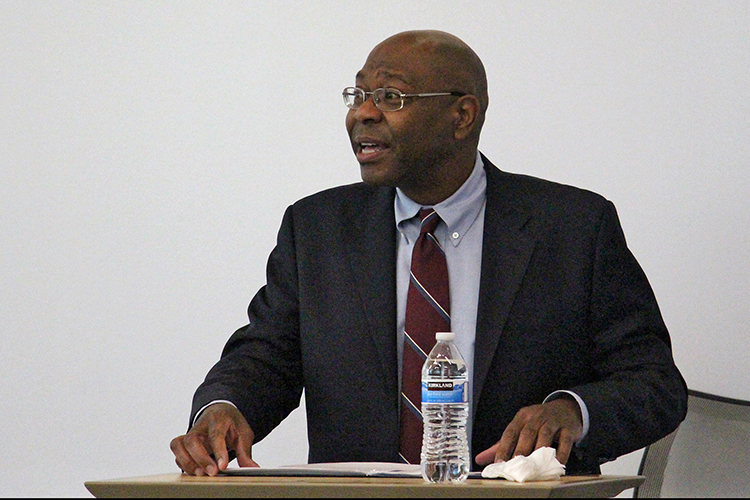
Wall Street Journal columnist and author Jason Riley delivers a talk on his book, “Maverick: A Biography of Thomas Sowell,” on Feb. 17 in MTSU’s Academic Classroom Building. (MTSU photo by Brian Delaney)
This is unfortunate, Riley said, because Sowell, a Chicago-trained empirical economist, has performed in-depth analyses pertinent to fully understanding contemporary debates on these issues.
 Sowell sacrificed popularity for the pursuit of scientific truth, the author explained.
Sowell sacrificed popularity for the pursuit of scientific truth, the author explained.
“For Sowell, personal notoriety was less important than having tested ideas prevail in policy decisions, regardless of who gets credited,” said Riley.
Sowell’s use of “data-driven evidence to examine social phenomena is a distinguishing feature of his scholarship that is never out of date,” Riley wrote in “Maverick.”
He added that the “intellectual fads that so often animate academics and media carry little weight with Sowell, who’s far more interested in learning the facts and then determining whether they match popular beliefs.”
Riley noted that while Sowell is perhaps best known for his writing on racial controversies, most of the economist’s output is more focused on the history of economic theory or the role of intellectuals in society. For instance, he is a leading expert on the economics of Karl Marx’s “Capital” and has also written in-depth about the knowledge problem that plagues central planners and government participants or leaders.
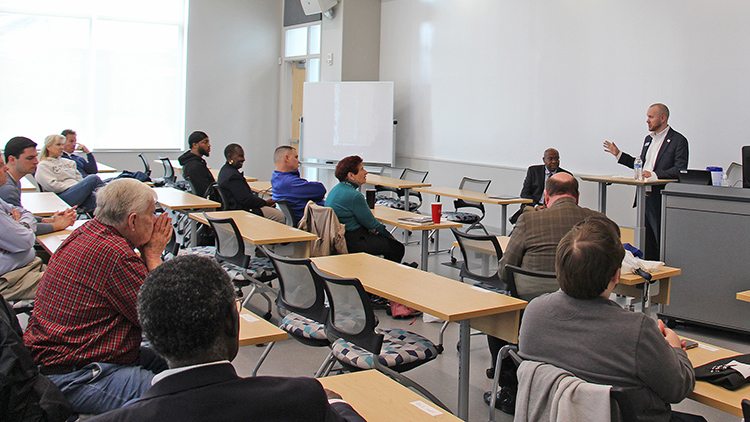
Political Economy Research Institute Director Daniel Smith, standing, introduces Wall Street Journal columnist and author Jason Riley for his “Maverick” lecture Feb. 17 in MTSU’s Academic Classroom Building. Riley’s appearance was supported by the Thomas and Martha R. Collins Free Enterprise Lecture Series and was held in conjunction with the university’s Black History Month celebration. (MTSU photo by Brian Delaney)
Sowell’s research frequently points to unintended consequences of government policies and programs, particularly when those consequences inhibit a public policy program from achieving its stated goals. Unintended consequences might emerge, for instance, when a new program distorts the incentives of those involved in it.
This level of formative and truth-seeking economic scholarship by noted economists like Sowell, as well as Milton Friedman and Nobel-winning MTSU alumnus James Buchanan, is what fuels the student-focused mission in the PERI at MTSU.

Dr. Daniel Smith
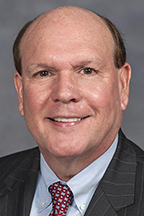
Dr. David Urban
Economics professor and PERI Director Daniel Smith coordinated Riley’s appearance on campus not only to help educate others on the important work of Sowell but as part of the celebration of African American History Month.
Smith said he views Sowell’s “Basic Economics,” “Knowledge and Decisions” and “A Conflict of Visions” as some of the most important books written on political economy.
“No matter what anyone may think of his conclusions, it is remarkable for a scholar to have produced so many pathbreaking works,” Smith said.
 “We were delighted to welcome students, faculty and community members on campus to hear diverse perspectives with Riley’s insight on Thomas Sowell. As a leading African American economist, Sowell is one of the foremost experts in the world on race and discrimination,” he added,
“We were delighted to welcome students, faculty and community members on campus to hear diverse perspectives with Riley’s insight on Thomas Sowell. As a leading African American economist, Sowell is one of the foremost experts in the world on race and discrimination,” he added,
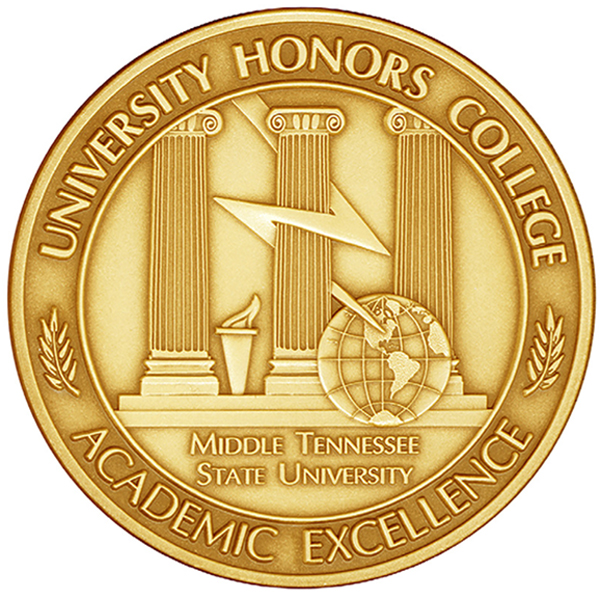 David Urban, dean of the Jones College of Business at MTSU, introduced the Thomas and Martha R. Collins Free Enterprise Lecture Series event with Riley and spoke on the importance of providing a diversity of viewpoints on campus.
David Urban, dean of the Jones College of Business at MTSU, introduced the Thomas and Martha R. Collins Free Enterprise Lecture Series event with Riley and spoke on the importance of providing a diversity of viewpoints on campus.
“We have had no shortage of excellent speakers hosted by the PERI, many of whom have been world-class scholars, business leaders and authors like Jason Riley, with reputations that extend far and wide. We present these speakers on campus as wonderful opportunities to broaden our intellectual horizons,” said Urban.
MTSU’s Political Economy Research Institute is a joint project between the Jones College of Business and the University Honors College. To advance its mission, the institute engages in research and educational programs that uncover the institutions and policies that encourage and enhance human well-being.
— Brian Delaney (Brian.Delaney@mtsu.edu)
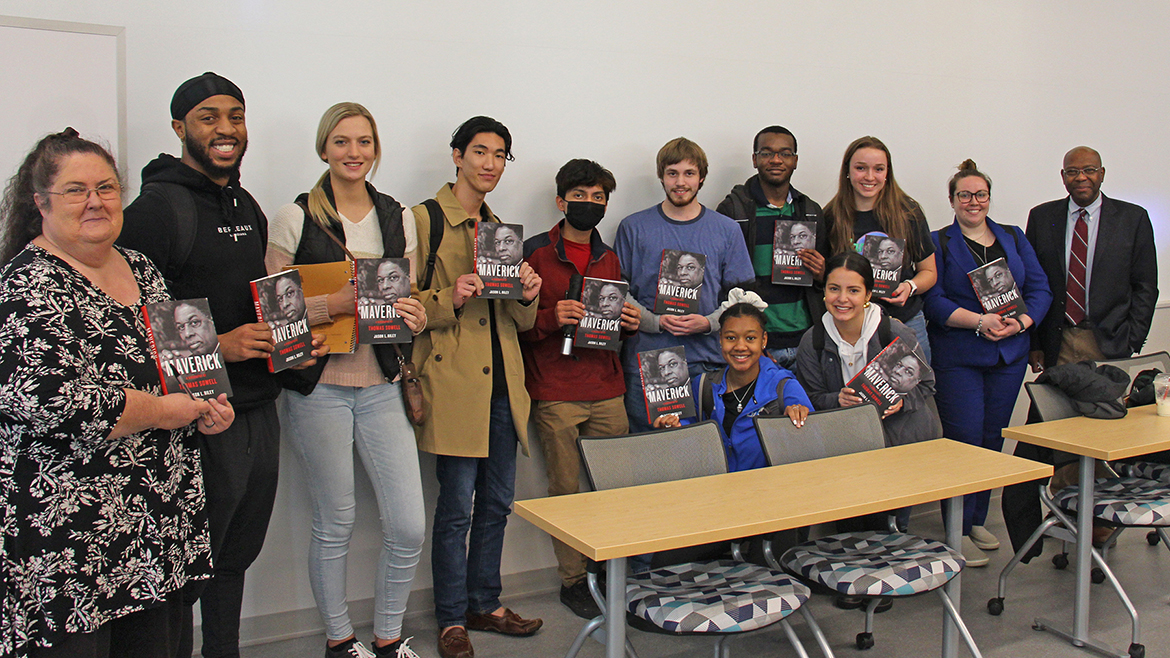
Dr. Maria Edlin King, left, director of the Tennessee Council on Economic and Free Enterprise Education and lecturer in the Department of Economics and Finance, poses with students from her class who attended the “Maverick: A Biography of Thomas Sowell” lecture by Wall Street Journal columnist and author Jason Riley on Feb. 17 in MTSU’s Academic Classroom Building. (MTSU photo by Brian Delaney)

COMMENTS ARE OFF THIS POST